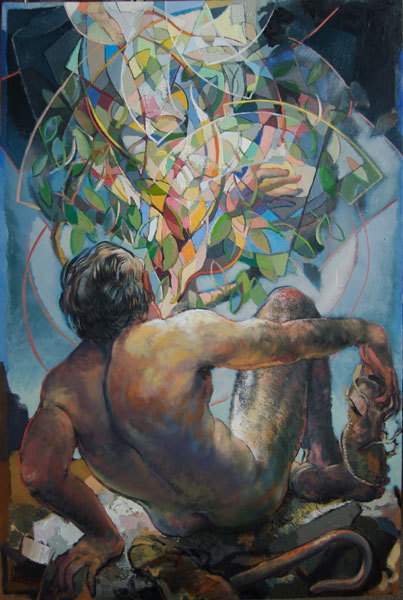What do we mean when we say “God”? This is the theme of a new sermon series. The intent is to wrestle with the language that we use to talk about the God we have encountered, believe in and follow. Language can take on baggage and history, for good and for bad. It carries the weight of our cultural history, as well as our personal stories. And so it’s not surprising that when we talk about “God” we might not always be talking about the same thing.
I chose to include the summary section in Exodus 2:23-25 along with the proposed traditional reading of 3:1-15, because I find it makes more sense. It highlights the paradox that Moses encounters the extraordinary in the ordinary, much as we are invited to discover the Divine Presence in our own lives. God is not removed from our daily lives, our past, or our future, but rather intimately present, intricately linked, and alongside us. The God talked about in this encounter with Moses, and larger story with the enslaved Israelites, is the God of Abraham, Isaac and Jacob. That title is mentioned three times in the text in 2:25, 3:6 & 3:15. It envelopes this encounter of Moses with the divine. He who has fled his past in Egypt, as he discovered his true history (that he is born an Israelite slave, not a ruling Egyptian) is confronted by the God of his people. He has run from his history and past, fleeing to Midian (chapter 2) to seek a new identity. Yet the God of his past pursues him into his present, to tell him that he will be what God first created him to be. This theophany (experience of God) is a splintering encounter, exploding the mind, vision and understanding of Moses, and then reconstructing it how it was first created to be.
The text begins with the affirmation that God remembered his people enslaved in Egypt. In Hebrew the word for Egypt is “Mitzrayim.” Translated, it can also mean “Narrow place” or “strait,” “tight spot” or “blockage.” The word is rich with metaphor and meaning. The Israelites fled to Mitzrayim in a time of famine, looking for a future with promised food when it was short elsewhere. But not that open space has become a tight spot, a narrow place in which they have been enslaved, trapped and now question their belief in a God that leaves them there.
Moses has fled this tight spot. He now survives in the wideness of the desert with the family of Jethro. In the ordinariness of his new life as a shepherd, the former prince, encounters the extraordinary living God in a bush: a simple common scrub plant. Yet this ordinary bush burns but is not consumed (how can that be?). It’s this extraordinary God who reveals the holy name, Yahweh. It’s Hebrew word for “to be” without vowels (Hebrew is written, like other Semitic languages, ie. Arabic, with consonants as the letters, and vowels added later, although they are not necessary). This name, commonly called the Tetragrammaton, is a conundrum as far as translations go. It’s nearly impossible to translate, that’s to say to translate in only one way. As it’s written without a tense, it can be translated in many ways: “I was who I was,” “I am who I am,” “I am will be who I will be,” “I am who I will be,” and simply put “I am.”
God comes down to Moses, and Moses becomes first aware of God’s concern for the Israelites, and then secondly that God wants to send him to Pharaoh to free his people. Throughout the encounter (and the rest of chapter 3) we see a gradual, yet definitive transformation of Moses from a blocked to a liberated person, from a fleeing prince to a steadfast leader of the common people. God comes to Moses to open his eyes, so that Moses can leave the confines of his life behind, that he can see the indelible connection between himself and his people, so that he can see the world in the way God sees it.
Questions for going deeper:
- How do you talk about God – something that’s indescribable, beyond language, in words?
- From what narrow place do you need to be freed?
- How do you desire to see the world the way God does?
